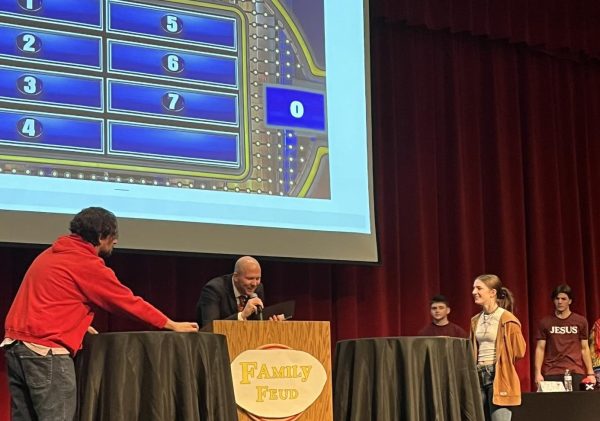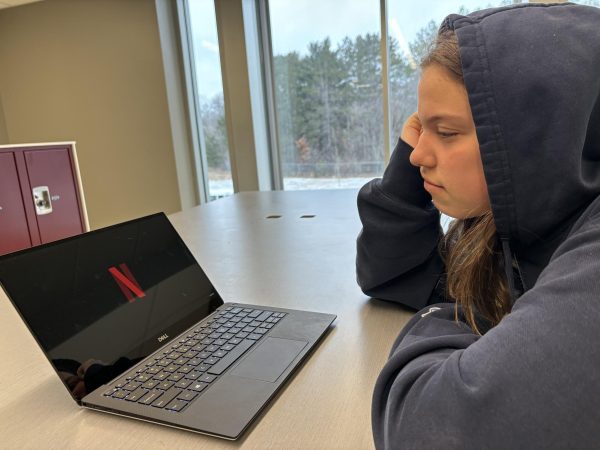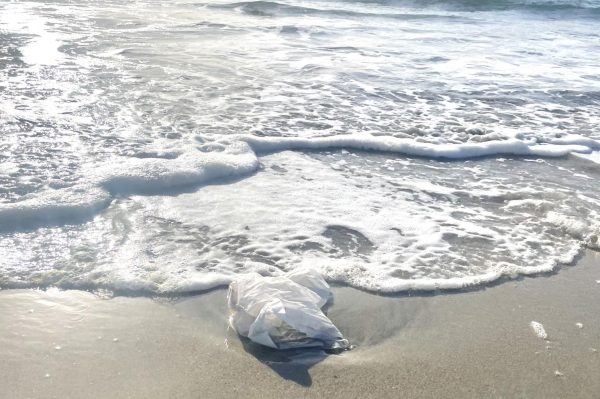Peters performs for Crimson Horizon
March 3, 2014
The glass door swings closed on the small basement room. Its walls are covered with a mellow green paint and adorned with artistically formed brass candle holders along with sculpted metal objects hanging from hooks. It is plain to see the previous owners of the space cared for it, putting forward effort and creativity to make the room not only liveable but aesthetically pleasing, permeating a peaceful working atmosphere for whoever worked at the well-constructed desk covered in books that now collects dust in a far corner of the small room.
These days, the basement study has been retooled for a new purpose entirely. The sounds of hard rock and gritty guitar grumbles ricochet off its walls, and the once refreshingly-styled room is now a mess of cords, amplifiers, and microphone stands that practically conceal the soft carpet. Gaps through which one can walk around the equipment are sparse, if there remain any to be found, and the only apparent sitting room is on a tiny corner futon partially covered by the case of a Gibson Les Paul. Instruments are tuned and the drums are given a preparative beating before junior Colin Peters gestures for the band to quiet down. Crimson Horizon is ready to play.
“We’re just going to run through our whole ‘Battle of the Bands’ setlist,” Peters says, before cranking out an explosive first chord to set the once-tranquil room into a frenzy of heavy electric decibels.
Initially the volume of the opening number, “Witches and Kings,” is unsettling in the cramped quarters. However, the song (written by Peters) only builds from its original level. The sound grows ever more furious and climaxes into a simply overwhelming fever-pitch. It is one of over 30 songs Peters has written throughout his budding musical career, over half of which have been performed in some capacity by Crimson Horizon.
The group’s sound is one of hard rock, complete with thumping drum solos, screaming guitar riffs, and strong-but-steady bass lines. Their influences include the Black Keys and the White Stripes, among many others, as the collective listening library of Crimson Horizon’s members is quite diverse. However, it is these hard rock roots which show through most in the band’s style and garage-band sound.
Crimson Horizon is comprised of three Stillwater students. Peters takes the helm as lead vocalist and guitarist, while senior Conor Murphy mans the bass guitar and junior Michael Larson commands the drums. The band formed almost three years ago after Peters and the band’s other founding member, junior Allen Burback, decided to perform at a local talent show. Peters rocks back onto his heels and laughs as he begins to tell the familiar story.
“Allen Burback and I were sitting in the choir room at Stillwater Junior High and our teacher passed out these informational packets about the ‘Variety Show’ that was happening at the high school. Allen and I looked at each other like, ‘let’s do it.’” The room falls into silence as Larson and Murphy lean forward, attentively listening. After a moment of thought, Peters continues.
“Then it was decided that we would play at the Variety Show. I played guitar and all Allen did was sing, so he was our singer. The two of us auditioned like that. We were told that we sounded good and that we should be careful to pick people that sounded good with us. We were told we could choose who we played with, or we could have a different band learn the songs and play with us. We decided we would use our own people,” Peters smiles jokingly and points to drummer Michael Larson, “Mikey was our first choice, and he was totally down for it.”
Larson laughs, as Peters’ Crimson Horizon origin story directly contradicts his own phony version, in which he and Peters were “the co-founders of Crimson Horizon.” Yet, after the true retelling by Peters, the absence of Allen Burback is more prominent in the room. The junior who contributed to the band’s initial days left the group in 2011, citing a general lack of enjoyment.
The brunt of the band’s songwriting responsibility falls on Colin Peters, given his impressive track record of writing in the past. “Usually it’s just fiddling around on the guitar. Messing around, playing different riffs. And if I find a new one that I really like I’ll expand it, make it longer and give it more chords,” Peters says. “After that, I make lyrics in a melody, and from there it just kind of plays itself out: wherever the song wants to go, it goes.”
He is by no means out on his own when it comes to the creative process, and on the contrary, the band’s collaborative nature is what allows it to perform at the efficiency it does now. “Collin takes my ideas and articulates them into lyrics,” says Larson. Murphy also plays a role. “We tweak [songs] every now and then, if I have a good riff, he takes it,” Murphy says.
Crimson Horizon won the Battle of the Bands on Jan. 24, for the second year in a row. For Colin Peters, however, the victory and prize money is in no way the most important part of the musical experience.
“The most rewarding thing as a musician, and this could go for anyone, really, is when you play your music, something you wrote, and you get an emotional reaction out of somebody.” Peters says. “For instance, [a friend] recorded me playing and showed it to his mom, and she started crying. It makes it all worth while.”
Greater than his connection to Crimson Horizon is Peters’ connection to the music he loves. He makes sure to meet with Larson and Murphy at least twice a week, but that doesn’t stop him from pushing his musical boundaries, even when it means doing so alone.
“Most of my time spent playing music is alone, just on an acoustic guitar in my room, writing songs that way,” Peters says. “Whatever I do, I want to keep music in my life somehow, whether I just play it as a hobby, or whatever. The dream is to really make it a career.”
https://www.facebook.com/pages/Crimson-Horizon/131025306971504










